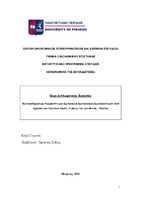Συναισθηματική νοημοσύνη και εργασιακή ικανοποίηση εκπαιδευτικών στον δημόσιο και ιδιωτικό τομέα. Ο ρόλος του διευθυντή – ηγέτη

View/
Keywords
Συναισθηματική νοημοσύνη ; Διευθυντής / Ηγέτης ; Εργασιακή ικανοποίηση ; Ενσυναίσθηση ; Αποτελεσματικότητα ηγεσίαςAbstract
The Emotional Intelligence theory may be applied in every aspect of daily life: school, family, home, social life, work. However, its greatest impact seems to take place in the workplace settings. Year by year the population believes that emotional intelligence is not just a commercial concept that only exists in the minds of the researchers but it can be a useful tool for improving working conditions and increasing the pace of the production process.
Teacher’s emotional abilities appear to have a significant effect on their motivation at work, on their interpersonal relationships and on their job satisfaction (Brackett, et al., 2008).
Therefore, the present study investigates the role of emotional intelligence of the school Principal / Leader in job satisfaction of the teachers. The sample of the research consists of 300 teachers of public and private schools throughout the country. The methodology applied was quantitative research using questionnaires.
The results of the current research reveal that the emotional intelligence of the Director contributes significantly to the competent management of human resources and job satisfaction of the teachers. Of course, the Director’s emotional potential and his interaction with the teaching work force have as an ultimate goal the maximum efficiency of the school unit. Furthermore, the research highlighted the necessity of the teachers in a working environment for adequate leadership that inspires and motivates.

